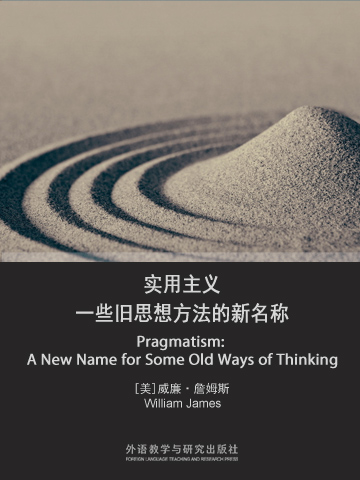要了解美国,就要了解美国影响最大的哲学流派——实用主义。
The word pragmatism is used everywhere today, from business to sports to politics. Although the word hadn't yet entered everyday language when William James published "Pragmatism" in 1907, the philosopher believed its doctrine had virtually become common sense in twentieth-century America. For James, pragmatism was a specific philosophical alternative to essentialism and foundationalism and argued that ideas are meaningful only insofar as they have practical consequences in concrete human experience; however today pragmatism has come to denote merely a general willingness to compromise principles, even to the point of selfishness or irresponsibility. Written in an engaging and accessible style, "Pragmatism" is a valuable corrective to modern uses of the word, since the voice that speaks in its pages embodies precisely the opposite values from the pejorative semes the word has acquired.
威廉•詹姆斯在《实用主义》一书中总结并推广了美国本土孕育的、影响最大的哲学流派——实用主义。《实用主义》全书收集了作者1906年在美国波士顿罗威尔研究所和1907年在纽约哥伦比亚大学发表的八篇讲稿。此外,还收集了另外四篇论文。
James propounded his theories of pragmatism in this book, one of the most important in American philosophy. In a sense, he wished to test competing systems of thought in the "marketplace of actual experience" to determine their validity, i.e. whether adopting a particular philosophical theory or way of looking at the world makes an actual difference in individual conduct or in how we perceive and react to the varieties of experience. In these pages, James not only makes a strong case for his own ideas, but mounts a powerful attack against the transcendental and rationalist tradition.
For anyone interested in William James or the history of American philosophical thought, Pragmatism is an essential and thought provoking reference. In this handy, inexpensive edition, it will challenge and stimulate any thinking person.
- Preface
- Lecture I The Present Dilemma in Philosophy
- Lecture II What Pragmatism Means
- Lecture III Some Metaphysical Problems Pragmatically Considered
- Lecture IV The One and the Many
- Lecture V Pragmatism and Common Sense
- Lecture VI Pragmatism’s Conception of Truth
- Lecture VII Pragmatism and Humanism
- Lecture VIII Pragmatism and Religion
- 书评 写书评
- 笔记
-
书评加载中...























 京公网安备 11010802032529号
京公网安备 11010802032529号
笔记加载中...